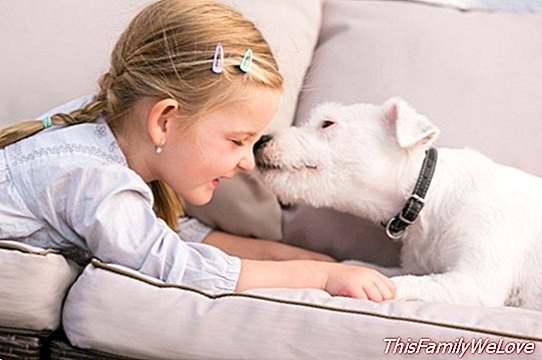A pet at home: advantages for children

Less loneliness, more games and many educational stimuli: these are the advantages for children having a pet at home. However, we must bear in mind that a good coexistence between children and animals, should always have the proper precautions.
Dogs, cats and, in general, all pets, exert a positive influence on child growth. In addition, they are given the opportunity to establish a close and direct contact with nature, which is becoming increasingly difficult in large cities. Currently, 42 percent of Spanish families own a dog or a cat, not counting birds, rodents and other species. More than 80 percent of these families consider their pet a source of well-being, according to a study conducted by Bayer's Animal Health division. Who has a pet, usually consider it as one of the family.
5 advantages of pets for children
In the case of children, pets can help them grow and develop in different aspects. These are some of the advantages for children of having a pet at home:
1. They are an incentive for movement, especially when the child crawls and also when he starts walking.
2. Help them feel safe. Children experience a feeling of confidence when their pet accompanies them. Touching and speaking to an animal develops feelings of affection, affection and security.
3. Increase your self-esteem, because the dog or the cat loves them as they are, and helps them when the children feel sad, while developing a more open and receptive character.
4. They develop their sense of responsibility, because they acquire the commitment to love the animal more, take care of it, feed it, protect it and respect it.
5. Encourage self-discipline and concentration, since the pet requires daily care.
Pets and children: good friends of games
Another advantage of having a pet at home is the amount of games that can be established between the animal and the child. But we must not forget that, since our son is so small, you should always watch over those activities, lest the animal, unintentionally, harm our son.
Dogs, for example, are playful by nature and puppies learn by instinct to bite very gently.
1. Persecution games. Dogs of active temperament enjoy playing hunting, searching, stalking and chasing. Playing hide and seek with the dog is an excellent diversion. You have to teach our son that he should not always persecute him, because you have to let the dog chase us too. If the dog gets too excited and starts jumping on the child, or biting his clothes, you have to stop playing, ignoring him for a few moments or giving him a little touch on the spine as a sign of "it's not good to bite".
2. Games to recover objects. Some kind of dogs, also enjoy retrieving balls and other objects thrown by the child. Too small balls are dangerous, because they could get stuck in the dog's throat and suffocate him in a few minutes. The best thing is a solid rubber ball and unbreakable and of adequate size.
3. Games of tug of war. Another kind of games is the tug of war with a rope or a rag toy that does not break. With some races, this game easily becomes a test of strength. So there's no letting them win forever. If they emit the slightest growl, you must immediately stop playing. Do not get used to playing with sticks or fallen branches, as they could splinter and their fragments could dig into the animal's throat.
Therapeutic effects of pets on children
Many specialists have seen in good pets a good therapy for children with different problems, both physical and psychological. Some recent studies, carried out by North American societies specialists in zooterapia, assure that the fact to watch the animal, to caress it, to play with him or to speak to him produces an immediate benefit, diminishes the arterial tension, relaxes and helps to eliminate the stress. In addition, it increases self-esteem and sociability in children who are deaf, blind, disabled or too shy.
These are the main therapeutic effects of pets:
- The animals return the smile to a depressed child
- Stimulate the social character of a shy child and with affective blocks
- Help control a child with violent impulses and relax nervous children
- Help people accept themselves As they are, this is because animals accept us as we are. Animals accept us and even give us signs of encouragement when we are not at the best time.
According to this professional, who performs Assisted Therapy with Animals, "pets teach us dignity and accept things in a simpler way.The horses for this are great masters and put us in touch with our most pure and wild instinct, instilling an air of naturalness to our impulses. From dogs we learn nobility and fidelity. Cats help us relax. "
Jaime Márquez
Advice:Isabel Salama, specialist in Animal Assisted Therapy




